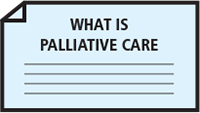Palliative Care
Any person, any age can have a serious illness.
Palliative Care helps relieve the pain, symptoms and stress of serious illness.

Palliative Care is specialized medical care for individuals living with a serious illness. This type of care provides relief from the pain, symptoms and stress of living with a serious illness. Palliative care can be offered to a person at any age (infant to adult), for any serious illness, and at any stage of illness from first diagnosis to end of life care.
A care team of physicians, nurses, social workers, faith-based clergy or chaplains and other specialists come together to offer an added layer of support to patients to live as well as possible with a serious illness, and also provide support to their families and caregivers.
Palliative Care can be provided at the same time a patient is being treated to cure a serious illness, or provide comfort care when curative treatments are no longer an option. Palliative care can be provided in a health care facility or a community-home based setting.
To Learn More- Download the fact sheets and view the videos below.
Talk to your physician if you think Palliative Care is right for. Your physician can arrange a Palliative Care consultation and services.
Here's a handy conversation guide called "Let's Talk About Palliative Care" to start a conversation:
Let's talk about Palliative Care!
Here are helpful fact sheet, webinars, and discussion guides. Consumers & health care providers can download the tools to start a palliaitve care conversation.
FACT SHEET
WEBINARS
Click image to view video.
"What is Palliative Care?"
For Everyone: Learn why Pallaitve Care is an added layer of support for individuals with serious illness- at any age, any serious illness, and any phase of health.
(Time 5:40)
Click image to view video.
For Consumers: "Palliative Care: Aligning the Team Around the Patient"
Webinar for Consumers: Patients, families and caregivers can explore palliative care and learn key questions to start a discussion with your care providers. Elizabeth J.Collins, MD, Palliative Care Medical Director, Lahey Hospital & Medical Center, provides a framework of the 5 stages of serious illness and how palliative care can be effective at each stage and all through a serious illness.
(Time 30:38)
For Care Providers: "Palliative Care: Aligning the Team Around the Patient"
Webinar for Care Providers: Every care provider can be a "first responder" to help patients diagnosed with a serious illness start a palliative care conversation. Learn key questions to open meaningful discussions with patients & clients. Elizabeth J.Collins, MD, Palliative Care Medical Director, Lahey Hospital & Medical Center, provides a framework of the 5 stages of serious illness and how palliative care can be effective at each stage and all through a serious illness journey. View individually or with your staff colleagues.
(Time: 30:00 content; followed by Q/A)
DISCUSSION GUIDES
For Consumers: “5 Things To Talk About With Your Care Providers”
Handy Discussion Guide for Consumers: You can bring this discussion guide to your next care provider appointment to start a palliative care conversation. The guide is based on a person's right to have information about your illness and treatment options, in order to make informed care choices. You can ask one question or a few questions. Talk often as your health needs and care choices may change over time. In English & Spanish.
"Cuidados Paliativos: Cinco Cosas que Hablar con tus Doctors"
For Care Providers: “5 Things to Talk About With Your Patients & Clients”
Handy Discussion Guide for Care Providers: Start a palliative care discussion with your patients, clients and families. This guide mirrors the consumer guide and is based on a person's right to have information about their illness and treatment options, in order to make informed care choices. You can ask one question or a few, and build on your discussions as health needs and care choices change. In English & Spanish.
"Cuidados Paliativos: Cinco Cosas que Hablar con tus Pacientes y Clientes"
Special thanks to Nicole A. Martinez AGPCNP, MSN, Palliative Care Nurse Practitioner, Allcare VNA/ Palliative Care/ Hospice for providing the Spanish translation for the discussion guides.
SPOTLIGHT: How can Palliaitve Care help?
"First diagnosis of a serious illness can be a great time to introduce Palliative Care."
"I find patients with complex medical needs welcome information about palliative care when first diagnosed," says Elizabeth J. Collins, MD, Medical Director, Palliative Care, Lahey Hospital & Medical Center. "It helps patients and families feel assured that we will walk with them all through their illness and provide needed care.
"Why wouldn't everyone choose Palliative Care? It's a no brainer."
That's what a patient recently said to Peggye Arcouette, LCSW and Liz Cambo, RN, Notre Dame Health Care, Worcester. Peggye (on right) and Liz report "our patients really welcome hearing about palliative care as a way to manage their everyday symptoms. It can greatly improve their quality of life."
 "Talking about care can clear up misconceptions about Church teachings"
"Talking about care can clear up misconceptions about Church teachings"
"The Archdiocese of Boston helps patients and families by educating them about palliative care, the importance of advance care planning, and Catholic Church teaching about these topics," says Diane McCarthy, MA, BCC, Parish Education Coordinator. Recently after a presentation, a woman with tears in her eyes said, "Thank you so much for what you said tonight. It brought me a lot of comfort. I had been struggling with choices that my brother made over the course of his illness and now I realize that what he did is supported by Church teaching. That means a lot to me." Read more here
 "Harvard Pilgrim Health Care respects the integrity of each individual member"
"Harvard Pilgrim Health Care respects the integrity of each individual member"
"Palliative Care is integral to meet the 'whole person' needs of members with often complex medical needs", says Patricia L. Toro, MD, Associate Medical Director, Harvard Pilgrim Health Care. "The goal of Palliative Care is the support and comfort of our members. Unfortunately, most members and their families don’t know about Palliative Care and it’s benefits. We hope that more members take advantage of the benefits offered in the coming months and years. Harvard Pilgrim Health Care is committed to make sure that every member can benefit from Palliative Care."
 "At first a bit hesitant ... then very grateful patients."
"At first a bit hesitant ... then very grateful patients."
"Some of my patients are a bit worried and fearful at first when embracing hospice care", says Ana Sonderson, RN, Care Dimensions, Danvers. "After experiencing the relief from stress and emotional and physical suffering that palliative care offers at this phase of life, I have found patients and families very grateful for the support and care."
What is Palliative Care?
Here are commonly asked questions & answers.








